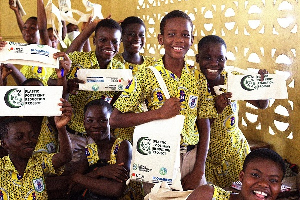 Some pupils who partook in the campaign
Some pupils who partook in the campaign
In a bid to combat the growing plastic waste crisis in the Accra Metropolitan Area, the Plastic Footprint Reduction Project (PFRP) embarked on a three-day sensitization and awareness campaign across three basic schools: Richard Akwe Memorial Basic School, Amamomo 1&2 JHS, and John Wesley Methodist Basic School on October 3 – 5 October 2024.
The initiative aimed to educate students about the dangers of plastic waste and encourage the adoption of reusable alternatives to single-use plastics, which pose significant environmental and public health risks.
During the three-day campaign, students were exposed to the detrimental effects of plastic waste, including its contribution to climate change, the degradation of ecosystems, and its role in urban flooding, a frequent issue in Accra. The project team highlighted how single-use plastics, such as plastic bags and bottles, persist in the environment for hundreds of years, breaking down into harmful microplastics that infiltrate food systems and pose serious health risks.
Presentations and interactive sessions were conducted under the theme "Plastics and Our Planet: Understanding the Impact and Taking Action." These sessions equipped the students with practical knowledge about the lifecycle of plastics, the environmental damage caused by improper waste disposal, and the importance of reducing plastic use.
One of the most significant outcomes of the campaign was the promotion of reusable alternatives to single-use plastics. The students were encouraged to adopt reusable items, such as tote bags, water bottles, and food containers, as part of a larger effort to reduce their plastic footprint. The project emphasized that while recycling is important, the most effective way to combat plastic waste is to reduce consumption at the source.
As part of the campaign’s commitment to action, free reusable bags were distributed to over 250 students across the three schools. The initiative aimed to make it easier for students to transition away from single-use plastic bags, which are often discarded after one use, contributing to environmental degradation.
A student from John Wesley Methodist Basic School shared their thoughts: "I didn’t realize how much plastic we use every day and how bad it is for the environment. The reusable bag will help me remember to stop using plastic bags, and I can share this with my family too."
The campaign also sought to empower the students as change agents in their communities. By engaging with the students, the project team encouraged them to take their newfound knowledge home, advocating for sustainable practices among their families and peers. The project highlighted that small, consistent actions, such as using reusable bags and reducing single-use plastic consumption, can make a significant difference in the fight against plastic pollution.
In addition to promoting individual behavioural change, the campaign aimed to foster a culture of environmental stewardship among the youth. The participating schools will be establishing sustainability clubs, where students can continue learning about environmental conservation, lead plastic waste reduction efforts, and promote eco-friendly practices within their communities.
The Plastic Footprint Reduction Project, led by the Alliance for Sustainability Education (ASEc), is supported by Bloomberg Philanthropies through the Accra Climate Action Fund, an initiative of the Accra Metropolitan Assembly (AMA). The project is expected to make a lasting impact on Accra’s waste management efforts by empowering young people to lead the charge toward a cleaner, more sustainable city.
Andrews Aibi Junior, the Lead Convenor of ASEc, expressed optimism about the future impact of the project, stating: "By educating and empowering these young students, we are laying the groundwork for long-term, community-driven change. It’s encouraging to see the enthusiasm from the students, and we’re confident that this initiative will create ripples across the city."
As Accra continues to face challenges related to waste management and urbanization, initiatives like the Plastic Footprint Reduction Project are crucial in addressing the city’s environmental issues. By equipping the next generation with the tools and knowledge to combat plastic waste, the project is helping to build a more resilient and sustainable future for Ghana.